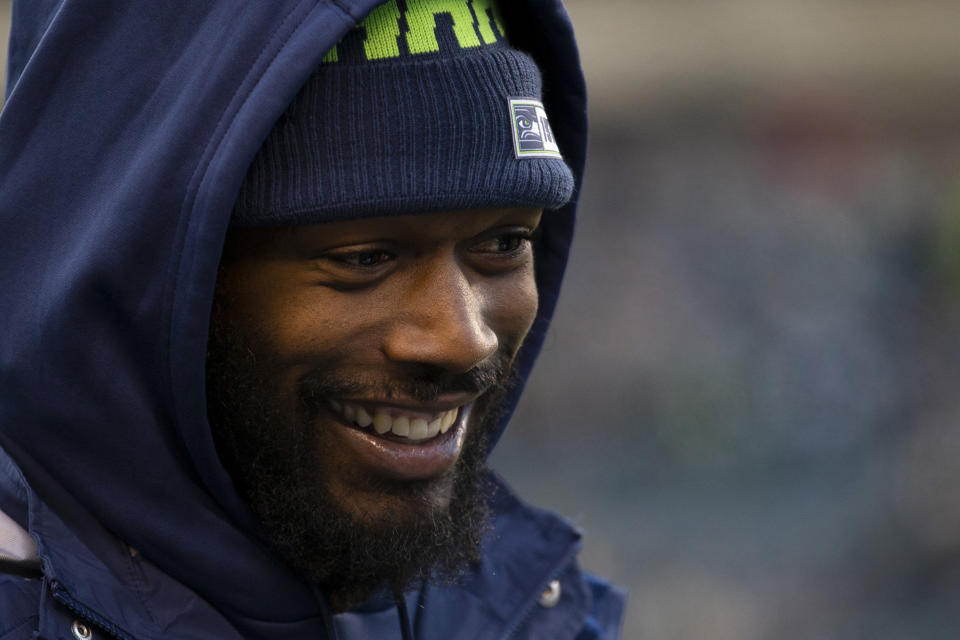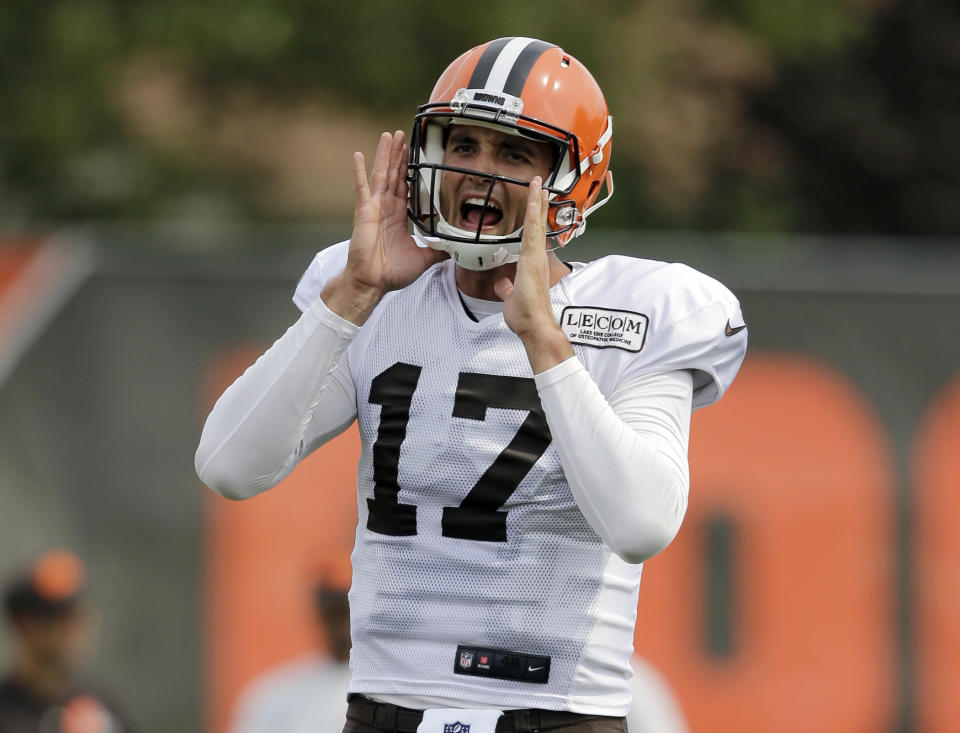Why did the NFL nix Saints' innovative sign-and-trade deal for Jadeveon Clowney?
While many around the country were enjoying backyard barbecues, pass rusher Jadeveon Clowney ended up signing with the Tennessee Titans on a one-year deal on Sunday night.
There was a fascinating possibility in the works, one the league apparently nixed, that could have helped kick down the door for more imaginative NFL trades in the future.
No knock on the Titans, whose good defense appears to have gotten better with the addition of Clowney. But the report that Clowney was almost signed by a different team — and then traded immediately to the New Orleans Saints — is a far sexier storyline.
And it’s one that could have altered the way teams think about trades.
Yes, the burgers and hot dogs were solid. But it’s like later finding out your host had originally planned to smoke a beef brisket. There’s a sadness that comes with hearing that type of what-might-have-been news.
These are the kinds of creative, outside-the-box moves the NFL needs more of. It’s the type of transaction that we see more of in the NBA, which always makes that league’s offseason a wild ride and allows star players to move more freely — and to preferred destinations.
So why didn’t it happen? Let’s unpack this a bit.

How Clowney almost joined the Saints
When New Orleans seemed to swoop in on the Clowney sweepstakes, there were questions from everywhere: How can they even afford it?
After all, there was talk of Alvin Kamara being on the trade block because the Saints didn’t want to meet his desired price tag. There’s the fact that the Saints currently are an unfathomable $70 million-plus over the projected 2021 salary cap. And at this moment, the Saints have less than a million in cap space. This is a franchise that is viewed as one that kicks the proverbial can down the road, as things relates to the salary cap.
How could this Clowney deal have worked?
Well, the Saints couldn’t meet Clowney’s asking price of around $15 million for this season. So they apparently were able to recruit a mystery team — roundly believed to be the Cleveland Browns — to help them land Clowney at a lower price.
The method: Have the Browns (assuming it’s them) sign Clowney to a one-year, $15 million deal that included a $5 million signing bonus and turn around and trade Clowney to the Saints, who then would take on his $10 million base salary.
The deal was believed to be for a second-round draft pick, plus another Saints player to help shed salary. In essence, the Browns would have traded $5 million in cash for a draft pick. It appears that the league caught wind of this deal and put the kibosh on it.
(Who would the player have been? We don’t know, but our guess is that it could have been center Nick Eason, who counts on the books for almost $6 million but would have been a backup in New Orleans with a healthy Cesar Ruiz, and the Browns have uncertainty with J.C. Tretter’s health. Again, it’s just a guess here.)
Even though the Clowney Deal That Wasn’t was unlike anything we’ve heard of, there at least was a predecessor to it.
Brock Osweiler, the (sometimes) anti-fun NFL and its ‘rules’
The NFL.com report indicated that the league wouldn’t approve the Clowney-to-New Orleans deal based on it circumventing the league’s bylaws. Here’s how that story read:
But several executives from different NFL teams said they couldn't recall any other team executing such a deal involving a free agent who was literally only signed to trade him. One exec summed up the interpretation of the league's bylaws as: “Fundamentally, you can't trade cash.”
Oh, really? Well, I read the NFL Bylaws. And I can’t seem to find that part.
How do you interpret this meaning, from Article XVI, Section 16.6?
By definition, a trade in the League is a transaction involving two or more clubs resulting in an outright or conditional assignment or exchange of player contracts, rights to players, selection choices, and/or cash ...
Rare as it might be in the NFL, you can trade cash. It’s typically not executed in a tit-for-tat way as it is in, say, MLB or the NBA.
One fairly recent example would be Leonard Williams being traded from the New York Jets to the New York Giants. In this deal, the Giants received Williams and $4 million in cash for a 2020 third-round pick and a 2021 conditional draft pick. In order to facilitate the trade, the Giants insisted on the Jets taking on some of Williams’ salary.
So that’s cool, but the Clowney deal isn’t? We reached out to an NFL spokesman for clarity but have yet to hear back.
Back in 2017, the cap-flush Browns — in the middle of another rebuild — constructed a fascinating deal that had many in the league stirring afterward. Cleveland sent a 2017 fourth-rounder to the Houston Texans for quarterback Brock Osweiler, a 2017 sixth-round pick and a 2018 second-round pick.

The Texans wanted to get Osweiler’s salary off the books after signing him to a four-year, $72 million deal (that essentially was a two-year deal if you factor in the lack of dead money after the second year of the contract). Basically, Houston was done with Osweiler and didn’t want to be anchored by his Year 2 money.
The Browns had all the cap space in the world at the time; what they wanted were draft picks. In essence, they paid cash — Osweiler’s roughly $16 million in salary that season — for a second-rounder the following year, with a slight loss in draft-pick value in 2017.
It was a brilliant trade for both teams. The Texans got out of a bad contract, and Osweiler still got his money for two years. The Browns wanted the future assets and were willing to pay for them. Oh, and that second-rounder the Browns got? It turned into Nick Chubb.
Again, that trade was rubber-stamped. But the Clowney deal wasn’t.
Saints head coach Sean Payton explained Monday how the justification for it being nixed was explained to him.
“It was one thought, just creatively, relative to essentially having a team sign a player, take some of the financial burden away from the team they’d trade him to and essentially they’d get a draft pick back,” he said. “The first response we got really from the league, we felt, was fairly positive.
“And then, ultimately, they decided against it, so we moved forward.”
The more NFL trades, the better
NFL trades involving players used to be very rare. In recent years, player-for-player and picks-for-player trades have seen an uptick.
That development has made the NFL offseason much more exciting. It has added a layer of intrigue to the operation and helped make pro football more of a yearlong obsession.
Perhaps we’ll get word back from league officials on why this type of deal was prohibited, especially, as Payton suggested, that it seemed kosher at first. If there’s a specific element to the NFL rules that was violated or circumvented that we’re not considering, we certainly can revise our stance.
But the bottom line is this: Creativity should be rewarded. Innovation should be embraced. This type of end around should be in every NFL team’s playbook.
Clowney seemed to be on board with it. The teams involved signed off on the parameters. Yes, maybe the Titans would have been upset, but the idea of the league quashing a potentially paradigm-changing trade feels a silly and contraceptive.
Credit should be given to the Saints’ Mickey Loomis and the Browns’ Andrew Berry – if indeed it was the Browns involved – for coming up with a clever way to open up possibilities of what a trade could encapsulate.
We suspect the league office took issue with the salary-cap ramifications, as if the Saints were skirting the rules. This felt like, at worst, a victimless “crime” with everyone getting what they wanted: Clowney his money, the Saints their pass rusher and the Browns their draft assets.
If the issue was a competitive balance thing, then the Osweiler deal never should have been allowed. And the bottom line here is that the Clowney deal should have.
More from Yahoo Sports:

